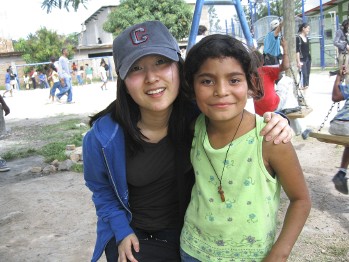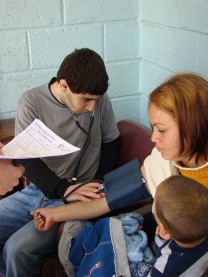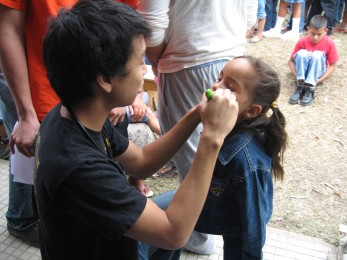OUTREACH
Students without borders head to Honduras with medical aid

Jane Rhyu 10, left, visits with a resident of an orphanage in Honduras. See larger image
It's a singular achievement to create a campus group to aid impoverished people in the developing world. It's an inspiration to establish it well enough to continue through future student generations.
These are the accomplishments of senior Jane Rhyu, who is majoring in biology with a concentration in neurobiology. In 2008 she founded a Cornell chapter of Global Medical Brigades, a program of the world's largest student-led international health and sustainable development organization. The group helps students organize trips -- called "brigades" -- to certain developing countries. There they set up mobile medical units to provide care to people who rarely, if ever, see a doctor. Most live in rural areas.
After two trips to Honduras, and with a third in the works, the chapter has so many students signing on, says faculty adviser Ron Harris-Warrick, professor of neurobiology and behavior, that it "is gaining a great reputation for pre-meds who cannot wait to eventually participate in Doctors Without Borders."

Paul Weiner 10 at the triage station in Honduras, taking a patients blood pressure. See larger image
Rhyu, who is headed to medical school in the fall, had heard about the program in January 2008, and by the early fall, she and several friends had established a Cornell chapter and began organizing for a January 2009 trip to Honduras during winter break.
In those few months, the group recruited other students through informational meetings and mass e-mails, recruited area physicians to be part of their mobile medical unit, raised funds, gathered medical supplies and ensured that all volunteering students obtained visas and vaccinations.
In the end, 16 Cornell students and two upstate New York doctors went on the inaugural trip and went to two sites in Honduras. At each site, the students signed the patients in, took vital signs, assisted the doctors and ran the unit's pharmacy, handing out medical supplies and medicines.
"Students who volunteer for the Global Medical Brigades get a real hands-on experience," says Rhyu. "You're actually helping other people, being involved in their care, while observing doctors at work in an international setting."
In just one week the unit treated more than 500 patients.

Tim Vo 10 takes the temperature of a young girl at the triage station. See larger image
Rhyu organized a second brigade to Honduras for June 2009 that included 20 students, and 50 students are planning to go to Honduras this May. She also has worked out a plan to transfer the leadership from the graduating seniors to upcoming juniors, ensuring the chapter's continuity.
"The Global Medical Brigades is not for those who just want clinical experience, but who want to serve and help others in need," says Ah-Reum Jeong, the new president of the chapter. "We always welcome donations, because we need to buy the medicines we take and cover the costs associated with sending and equipping the volunteer doctors."
"We're going to set up an alumni network," says Rhyu. "I would love to come back to the chapter -- not as a student but as a doctor. It would be a nice way to complete the circle."